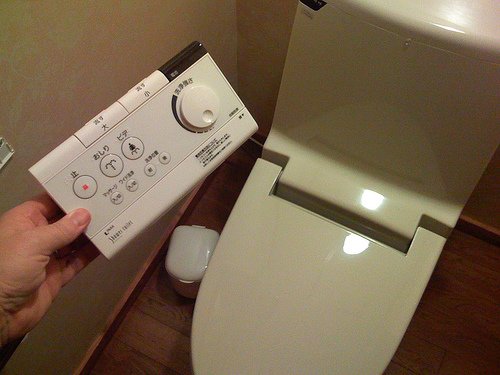Japan is a country that’s definitely in touch with its seasons, and they celebrate each time of year with many different traditional events, from cherry blossom viewing in April to enjoying the turning of the leaves in the Fall. It’s summer now, the time of festivals and wearing yukata cotton kimonos and geta wooden shoes while enjoying fireworks, and there are many foods that help people survive the sweltering temperatures. Having a long tradition of eating noodles, many Japanese naturally enjoy cold soba or udon noodles during this season, as well as “angel hair” udon noodles called somen. One of our favorite summer foods is called hiyashi chuka (hee-YA-shee chuu-KAH), essentially a plate of cold ramen noodles in a tangy sauce served with tomatoes, cucumbers and strips of scrambled egg on top. Watermelon is always a treat but it can be such a mess, so I usually reach for Watermelon Bar, a delicious brand of watermelon ice cream with chocolate “seeds” that tastes so good. One of the most famous of all summer foods is not one I’m too fond of: unagi (oo-NAH-gi), or Japanese eel, which is broiled over an open flame and served on rice with teriyaki sauce. It’s considered “stamina food” here in Japan, and many restaurants offer the dish to their customers in August to help them beat the heat. Unagi-don (Eel Rice Bowl) actually looks delicious, but I just can’t get past the “eel-ness” of it all.

Ever since the coming of the Sony Walkman the Japanese have been known for their gadgets, which is a good thing for all of us, as the world would be less interesting if it weren’t for all those fun electronic devices. From massage chairs that take the stress out of your muscles and squeeze your body from several directions at once to cell phones that let you pay for train tickets and convenience store purchases by waving the phone at a sensor, it’s always fun to see what new inventions lie over the horizon. One of the most famous of all Japanese gadgets are those toilets which wash your butt when you’re done, which are known as “washlets” (wash + toilet, get it?). Based on the European bidet, Japanese washlets were first introduced by ubiquitous toilet maker Toto in 1980, and have grown in popularity ever since. Most of these washing toilets share the same basic features, including a selector for which er, part or the body you want to wash, a warm air dryer, and a control to set the desired temperature of the toilet seat. Some of the more advanced models freshen the air with negatively charged ions, contain sensors that check your blood sugar as you pee, and (great families with boys) raise and lower the seat as needed hydraulically. The other day I found a washlet with a fully functional remote control that allowed you to control the cleaning functions or flush the toilet from a remote location. This seemed useless to me, as the only possible use for a remote controlled toilet would to play practical jokes on people you didn’t like, turning the functions on and off at random while they did their business.
I talked recently about the current scandal over missing national pension payments and how having a few thousand more lawyers might help the situation. It may be odd to hear someone wish for more lawyers, but in the case of Japan it might not be a bad idea. Japan is quite different from the U.S., and some services that we take for granted in America are not provided to people who need them because the legal system seems so distant from the average person. In Japan lawyers are quite rare — I have yet to meet one in my sixteen years of living here, and have no idea where a courthouse might be located in my city. Part of the reason for this is that the test to become a lawyer is about as difficult as the entrance exam for Tokyo University, but the way Japanese society is sewn together is quite different as well. In Japan, for example, no one needs a will because how their estate will be passed on to survivors in the family is governed according to the rules of “common sense” (joshiki), and you do most paperwork filing that might normally require a lawyer for free at your your City Hall. In Japan, lawyers are extremely respected, being among the professions addressed with the honorific word “sensei.” Some other professions that receive this polite term are doctors, teachers, politicians, artists and — I am not kidding — Certified Public Accountants.

We’ve got a great announcement for fans of our popular Japanese T-shirts today: by massive customer request, we’re making youth sizes of our most popular shirts! Now you can get kids’ sizes of our cool Domo-kun (Three Circle and Black Outline) and Totoro (both blue and grey) in standard youth sizes S, M and L, which is great news to the many younger fans of Totoro and Domo-kun who couldn’t wear our standard-sized offerings before. Whether you’re buying for the Back to School season or looking beyond, our new kids-size T-shirts are great!















